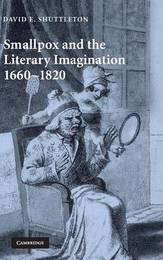
|
Smallpox and the Literary Imagination, 1660-1820
Hardback
Main Details
| Title |
Smallpox and the Literary Imagination, 1660-1820
|
| Authors and Contributors |
By (author) David E. Shuttleton
|
| Physical Properties |
| Format:Hardback | | Pages:280 | | Dimensions(mm): Height 236,Width 161 |
|
| Category/Genre | Literary studies - c 1500 to c 1800
Literary studies - c 1800 to c 1900 |
|---|
| ISBN/Barcode |
9780521872096
|
| Classifications | Dewey:820.93561 |
|---|
| Audience | | Professional & Vocational | |
|---|
|
Publishing Details |
| Publisher |
Cambridge University Press
|
| Imprint |
Cambridge University Press
|
| Publication Date |
17 May 2007 |
| Publication Country |
United Kingdom
|
Description
Smallpox was a much feared disease until modern times, responsible for many deaths worldwide and reaching epidemic proportions amongst the British population in the seventeenth and eighteenth centuries. This book is a substantial critical study of the literary representation of the disease and its victims between the Restoration and the development of inoculation against smallpox around 1800. David Shuttleton draws upon a wide range of canonical texts including works by Dryden, Johnson, Steele, Goldsmith and Lady Mary Wortley Montagu, the latter having experimented with vaccination against smallpox. He reads these texts alongside medical treatises and the rare, but moving writings of smallpox survivors, showing how medical and imaginative writers developed a shared tradition of figurative tropes, myths and metaphors. This fascinating study uncovers the cultural impact of smallpox, and the different ways writers found to come to terms with the terror of disease and death.
Author Biography
David E. Shuttleton is Lecturer in English at the University of Wales Aberystwyth.
Reviews'Smallpox and the Literary Imagination provides fascinating reading and ... it adds much to our knowledge of the social and political impact of this disease. I certainly gained much from reading this book and it deserves a wide readership. I recommend it to anyone with an interest in the history of disease in the early modern period.' Local Population Studies
|